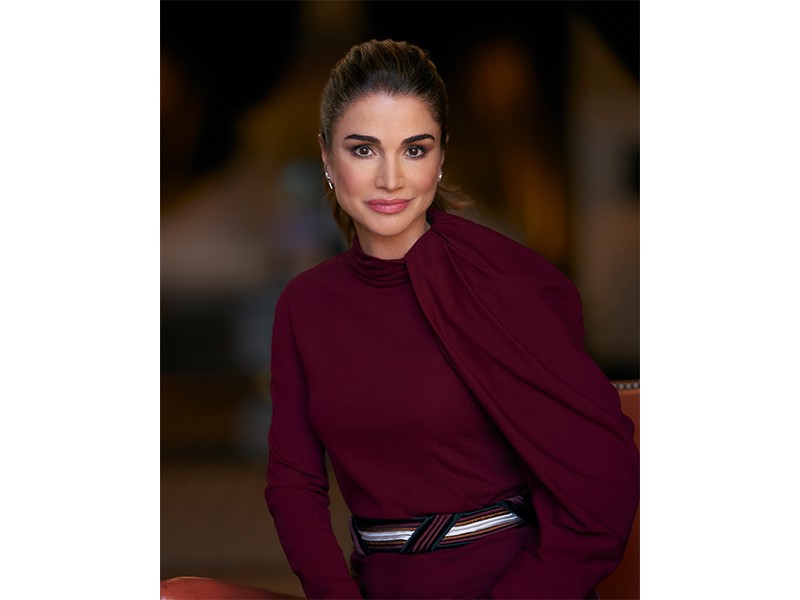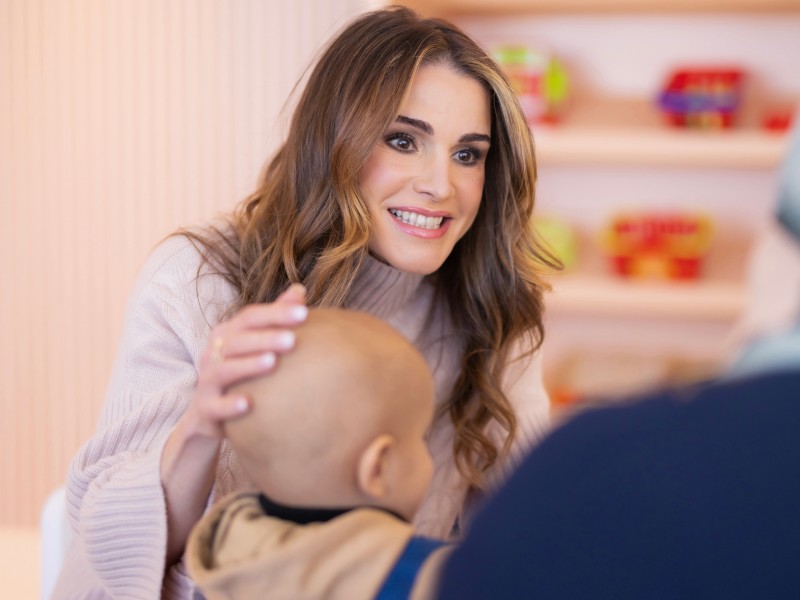Queen Rania Talks about Her New Book "The Sandwich Swap" on The View
Barbara Walters (BW): Our next guest is a children’s author, who car pools, and who bakes cookies, and tweets. By the way she also happens to be royalty. It is our pleasure and honour to welcome Her Majesty Queen Rania of Jordan. Also with respects to other Queens the most beautiful.
HMQ: Oh thank you. That’s very kind of you Barbara.
BW: Thank you. I have had the pleasure of knowing Her Majesty for quite a few years, I think even before you became Your Majesty. So you have been married now for what, how many years?
HMQ: I’m losing count now. About sixteen now, sixteen coming up to seventeen, something like that.
BW: And you’ve been on the throne for eleven years.
HMQ: Eleven years, yup.
BW: Married to King Abdullah. You say that you don’t think of yourself as a Queen. What do you think of yourself as?
HMQ: Well you know, I think you know, like you say it’s been eleven years, and over time I’ve gotten used to the position, maybe gained a bit of confidence. But I don’t think there’s one day that I haven’t woken up and not felt that I need to earn this title. I mean I don’t feel that the title entitles me to anything you know. I feel that you know I need to prove myself, I need to make sure that Iespouse the right kind of values, and give the right kind of service to the people and help out. So it’s jus I distance the person from the persona.
BW: You’ve also got those children that you have to...
HMQ: Absolutely. At the end of the day I think of myself as a mother, as a wife, and you know you have the concerns that you have for your children, and you worry about whether they’re doing well in school etc. I mean from the outside looking in people are very mesmerised by the whole Queen thing, but for me it’s just everyday life you know.
Sherri Shephard (SS): One thing, I’m sorry Your Majesty, like you said you have been married for seventeen years, but it seems like this is every little girls’ dream....
HMQ: Right.
SS: ...to be like a you know a Your Majesty. So how did you meet your King?
HMQ: I actually met him at his sister’s house. I had been invited there for a dinner and he was on military, in the military. He was on military exercise, but he had done so well his Dad said why don’t you go take a break and you know just hang out in Amman for the weekend. And he happened to be at that dinner and I think it just it kind of just love at first sight.
BW: He says it was love at first sight. Was it for you?
HMQ: It was but I was personally intimidated by the whole royalty thing so for me you know I wasn’t sure what to make out of it, but at the end of the day he was just a nice guy, and he was you know a great guy and we got to know each other and it was just a normal relationship.
Elisabeth Hasselbeck (EH): You may say you feel that you may need to earn the title. When my daughter Grace saw your picture on the back and I told her who you were, and I said Queen, she thought she hasn’t stopped holding the book since.
HMQ: Really.
EH: So you’ve earned it in her eyes.
HMQ: Well you know when she sees me she gets disappointed because I’m not wearing the crown. That’s what they always expect.
EH: I want to ask you about... Go ahead Whoop.
Whoopi Goldberg (WG): Well, one of the things that I know that you really have been pushing is the issue of education for young women.
HMQ: Absolutely
WG: And you’ve been really on top of that.
HMQ: I’m really, really passionate about that because I really feel when you think of girls, a lot of time people think of girls and they think they’re just soft and vulnerable. When you think about some of the most pressing issues in our world, where there’s poverty, hunger, climate, everything, girls have the power to really transform societies, you know, girls are made of steel when it comes to solving these problems.
BW: Especially...
HMQ: If you educate a girl you really change a nation.
BW: But especially in your part of the world.
HMQ: In every part of the world. You know because when a girl gets educated she gains confidence and self respect, she delays marriage and has less children, she spends ninety percent of her income on the education and health of her own children, as opposed to men who only spend about fifty per cent. Sorry guys, but that’s that’s ...
Joy Behar (JB): A lot of girls in the world are held down by religion sometimes and men who are in power.
HMQ: A lot of girls, wherever I travel all over the world I just find that there is inequality when it comes to girls. It’s like they’re the last in and the first out. So when things are going well they’re the last to go to school. And when things are going bad they’re the first ones to be kicked out.
BW: Is there inequality in your country?
HMQ: Is there?
BW: Inequality in your country.
HMQ: Not when it comes to education. In fact you know we have more women at the university level than we have men. And equal education at primary levels. But there are many parts in the world, you know there’s seventy two million children out of school today, and the vast majority of them are girls. They’re out because they’re fetching water, they’re working in factories, they’re getting married early. We need to really prioritise them and get them back in to school.
JB: Do the girls wear burqas in your country?
HMQ: No we don’t have burqas, no. Veils.
WG: It’s interesting that you should ask that question because you’ve launched a YouTube channel to clear up Muslim stereotypes. If you wouldn’t mind would you just give us some ideas of what you’ve put on there so people will..
HMQ: Well yeah, the idea was that you know I feel that there are a lot of stereotypes about Arabs and Muslims that are you know distorting and disingenuous, and for all the politicians saying that we need to have cross cultural dialogue, I think those things can, those bridges can be made through conversations between people, through friendships. And it’s not by lecturing. So the YouTube was a good way to get people involved. It started a global conversation and I could see how like contacts turned in to friendships, and people were just submitting their stereotypes and views about Arabs and we were just taking them down. I think people started to question their assumptions and to see things a little bit differently. And it’s so important that we do this. We all have a vested interest in seeing eye to eye.
SS: Well Your Majesty speaking of friendships you wrote this very wonderful book. Again we’re talking about The Sandwich Swap, and this book was inspired by your childhood, a childhood incident. Can you tell us about the Sandwich Swap?
HMQ: Well actually it was when I was five years old, I used to go to school, and when it’s lunchtime I proudly unpacked my, opened up my lunchbox and eat my lovely houmous sandwich with its predictable texture.
BW: That’s houmous there. It’s just chickpeas.
HMQ: It’s chickpea paste, yeah. It’s actually very, very healthy, it’s a really good option. And the girl sitting next to me, who was American, she would bring out this what I thought was this purple gooey stuff that looked kind of revolting. And I always thought mine was so much better, And then one time she asked me to take a bite. And once I tried it I realised how much I loved it and at a very young age you know we I realised that you know you shouldn’t fear the unknown or second guess diversity because I had committed an injustice towards her by judging her without even trying it.
SS: Try some houmous.
EH: It really is great way to...
BW: I just want you to know that we have a peanut butter and jelly sandwich and a houmous sandwich, and before I said to Shelley which one do you want? And she said...
SS: Peanut butter and jelly.
BW: I’ll take the houmous.
HMQ: I kind of love the peanut butter and jelly too.
BW: Karen left with the houmous.
WG: I take the houmous with pretzels.
BW: Okay.
EH: But it’s a really great story for girls.
HMQ: It’s really important to instill those kind of values in our kids, especially now because we live in a global world you know. Our kids can’t get by just by confining themselves to their neighbourhoods. They need to get a feel for the world beyond and I think that enhances their chances of success. It makes them more likeable when they can relate to other cultures and other people you know, so I..
BW: This is not bad at all, this is not bad at all you know.
HMQ: I’m glad you like it.
BW: I’d rather have the peanut butter with jelly. But it is a book that has a message that is a charming book. Your Majesty, we’re very happy to have, I’ll have to swallow the houmous, we’re very happy to have had you on with us today. It was a great pleasure and honour.
HMQ: Thank you so much it was great to be here.
BW: Thank you for being with us and for the wonderful work that you’re doing for your country and.... Her Majesty Queen of Jordan. We’ll be right back
Featured
Queen Rania's official website
This website does not support old browsers. To view this website, Please upgrade your browser to IE 9 or greater
Your browser is out of date. It has known security flaws and may not display all features of this and other websites. Learn how to update your browser



